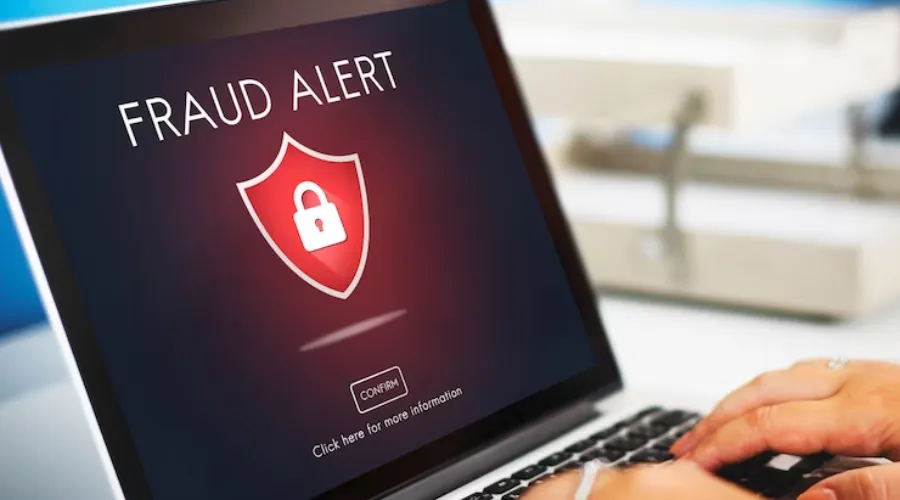As we navigate the intricacies of our interconnected digital world, the specter of fraud and scams looms large, casting a shadow on the very technologies that have revolutionized our lives. In an era where financial transactions, personal communications, and shopping have migrated to the online realm, fraudsters and scammers have seized the opportunity to exploit vulnerabilities and prey on unsuspecting individuals.
1. Understanding fraud and scams

What is Fraud?
Fraud, in its essence, is a malicious act of deception orchestrated with the intent of gaining something valuable, often at the expense of others. It encompasses a wide spectrum of deceitful practices, ranging from financial fraud to identity theft and elaborate schemes that lure victims into a web of treachery.
Types of Scams
Scams, like the proverbial Hydra, manifest in various forms and adapt to the digital age with cunning precision. They take the shape of phishing emails, fraudulent online storefronts, and investment opportunities that promise riches. But their ultimate goal remains consistent: to swindle individuals out of their money or personal information.
The Anatomy of a Scam
Every fraud and scam, regardless of its intricacy, follows a distinct pattern. It commences with initial contact, wherein the scammer reaches out to the unsuspecting victim through various channels. The deception then ensues as the scammer crafts an illusion of trustworthiness, often impersonating reputable entities or individuals. Subsequently, manipulation comes into play, as victims are coerced or duped into divulging sensitive information or transferring funds. The exploitation phase witnesses the misappropriation of the obtained information or money for fraudulent purposes. Finally, like a phantom, the scammer vanishes, leaving victims bewildered and grappling with the consequences of their actions.
2. The Digital Age of Scams

Online Scams
The digital age has spawned a new breed of scams, characterized by their reliance on the vast reaches of the internet. Scammers operate within the shadows of cyberspace, deploying sophisticated websites, emails, and social media platforms to ensnare their prey. These online scams are designed to appear authentic, making them particularly treacherous.
Social Engineering Tactics
While technology plays a pivotal role in facilitating scams, it is the human element that fraud and scams exploit with finesse. Social engineering tactics prey on our innate trust, emotions, and psychological vulnerabilities. Understanding these tactics is crucial in fortifying one’s defenses against manipulative schemes.
The Rise of Cryptocurrency Scams
The advent of cryptocurrencies has opened up new avenues for exploitation. Scammers leverage the allure of digital currencies to lure victims into fraud and scams investment schemes, Ponzi schemes, and fake initial coin offerings (ICOs). Being aware of these cryptocurrency scams is imperative for those seeking to invest in this burgeoning space.
3. Common Types of Scams

Phishing Attacks
Phishing attacks are among the most prevalent scams, involving the use of fraud and scam emails, websites, or messages to deceive individuals into revealing sensitive information. Recognizing the hallmarks of phishing attempts is essential for safeguarding personal data.
Identity Theft
Identity theft is a nefarious practice that can wreak havoc on an individual’s financial life. Scammers employ various methods to steal personal information, ultimately leading to financial losses and emotional distress.
Online Shopping Scams
Online shopping should be a convenient experience, but scammers have devised fake online storefronts to dupe consumers. Recognizing these fraud and scam retailers is vital for safe online shopping.
Investment Scams
Investment scams promise lucrative returns on investments but often deliver financial ruin. Understanding the red flags and tactics used by fraud and scam investment schemes is crucial for preserving one’s wealth.
Lottery and Sweepstakes Scams
The promise of a windfall can blind individuals to scams masquerading as legitimate lotteries and sweepstakes. Learning to differentiate between genuine opportunities and scams is paramount.
4. Recognizing and Responding to Scams
Red Flags to Watch For
Spotting scams early is pivotal in preventing financial losses. Being attuned to red flags, such as unsolicited communications, urgent demands for personal information, and suspicious payment requests, should prompt immediate scrutiny.
Tips to Identify Phishing Emails
Phishing emails constitute a prominent attack vector. Developing the skills to identify phishing attempts, including checking sender email addresses, scrutinizing URLs, and verifying senders’ legitimacy, is essential for protecting sensitive information.
5. Protecting Yourself from Fraud and Scams
Strengthen Your Online Security
Bolstering online security entails adopting robust practices, such as using complex, unique passwords for each account, installing reputable antivirus software, and ensuring that software and systems are regularly updated.
Enable Two-Factor Authentication (2FA)
Two-factor authentication provides an additional layer of protection for your accounts by requiring a second verification step, often in the form of a code sent to your mobile device.
Verify Website Legitimacy
Before conducting transactions on a website, it’s essential to verify its legitimacy. Checking for secure connections (HTTPS), scrutinizing website addresses, and researching online reviews can help you avoid fraud and scams on online platforms.
Secure Your Personal Information
Safeguarding your personal information involves limiting its exposure online, shredding sensitive documents before disposal, and regularly monitoring financial accounts for any signs of unusual activity.
Educate Yourself Continuously
The landscape of fraud and scams is ever-evolving. Staying informed about the latest scam trends and tactics is crucial for maintaining your defenses against emerging threats.
6. What Should I Do if I’ve Been Scammed?
Stay Calm and Assess
Discover the importance of maintaining composure and clarity of mind in the immediate aftermath of falling victim to a scam.
Document Everything
Learn why meticulous record-keeping, including notes on communications and financial transactions related to the scam, is essential for reporting and potential recovery efforts.
Report to Law Enforcement
Understand the steps involved in reporting a scam to local law enforcement authorities and why your cooperation is pivotal in addressing fraud and scams.
Notify Financial Institutions
Discover how notifying your bank or credit card company about unauthorized transactions can lead to a more effective response and potential recovery of lost funds.
Report to Online Platforms
If the scam occurred on an online platform, learn how reporting it can protect others from falling victim and contribute to the overall fight against fraud and scams.
7. How Can I Report a Scam?
Reporting to Local Authorities
Find out how to report scams to your local authorities, ensuring that they are aware of fraud and scam activities in your area and can take appropriate action.
Federal Reporting Agencies
Explore federal agencies responsible for tracking and addressing scams, such as the Federal Trade Commission (FTC) in the United States.
Reporting to Financial Institutions
Learn how to report scams to your financial institutions and why their involvement is crucial in preventing further losses.
8. Can I Get My Money Back After Being Scammed?
Contact Your Financial Institution
Discover how reaching out to your financial institution can potentially lead to the recovery of funds lost in a scam and the prevention of further financial harm.
Seek Legal Advice
When significant losses occur, consulting an attorney may be necessary to explore legal options for recourse against the scammers.
Share Your Experience
Learn how sharing your experience with scams can serve a dual purpose: helping others avoid falling into similar traps and fostering a sense of community vigilance.
9. Staying Informed and Vigilant
Keep Up with Scam Trends
Stay updated on emerging scam trends and tactics to remain one step ahead of fraud and scams that continually adapt their methods.
Educate Your Loved Ones
Extend your knowledge and experiences to your family and friends, ensuring that they are also well-prepared to protect themselves from scams and fraud and scams.
What are some common types of fraud and scams?
Some common types of scams include:
- Phishing Scams: Scammers send deceptive emails or messages that appear to be from legitimate organizations to trick you into revealing personal information like passwords or credit card details.
- Identity Theft: Identity thieves steal your personal information, such as Social Security numbers or financial data, to commit fraudulent activities in your name.
- Online Shopping Scams: Fraudulent online stores offer products at unrealistically low prices or sell non-existent items, leaving you with nothing but financial losses.
- Advance Fee Fraud: Scammers promise you a large sum of money or a valuable prize but ask for an upfront fee or personal information to claim it, after which they disappear.
- Romance Scams: Fraudsters create fake online personas and engage in romantic relationships with victims to exploit their emotions and convince them to send money.
- Tech Support Scams: Scammers pose as tech support agents, claim your computer has issues, and request remote access or payment for fixing non-existent problems.
- Investment Fraud: Scammers offer high-return, low-risk investment opportunities, often in non-existent or fraudulent schemes, causing investors to lose money.
- Lottery or Prize Scams: Victims receive notifications claiming they’ve won a lottery or prize but must pay fees or provide personal information to claim their “winnings.”
What should I do if I’ve been scammed?
These are the following things one should do when scammed:
- Cease Contact: If you’re in communication with the scammer, stop all interactions and block their contact information.
- Preserve Evidence: Keep records of all communications, emails, messages, or documents related to the scam as evidence for potential reporting.
- Report the Scam: Report the scam to the relevant authorities and organizations, including your local law enforcement agency and consumer protection agencies.
- Inform Your Financial Institution: If you’ve shared financial information, contact your bank or credit card company to secure your accounts and dispute any unauthorized charges.
- Change Passwords: Change your passwords for all accounts that may have been compromised, especially online banking and email accounts.
- Monitor Your Finances: Regularly monitor your bank and credit card statements for any suspicious activity, and consider freezing your credit to prevent further identity theft.
How can I report a scam?
Reporting a scam is essential to help authorities track down scammers and prevent them from victimizing others. Here’s how to report a scam:
- Local Law Enforcement: Contact your local police or law enforcement agency to report the scam. Provide all available information and evidence.
- Consumer Protection Agency: In the United States, you can report scams to the Federal Trade Commission (FTC) through their website at ftc.gov/complaint.
- Internet Crime Complaint Center (IC3): If the scam involved online activities, file a complaint with the IC3, a partnership between the FBI and the National White Collar Crime Center, at ic3.gov.
- Your Financial Institution: Inform your bank or credit card company about the scam. They can help you secure your accounts and investigate any unauthorized transactions.
- Better Business Bureau (BBB): Report scams to the BBB to help others avoid falling victim to the same fraudsters. Visit their website at bbb.org
Can I get my money back after being scammed?
Recovering your money after being scammed can be challenging, but it’s not impossible. Here are some steps to take:
- Contact Financial Institution: If you paid through a bank transfer or credit card, report the scam to your financial institution immediately. They may be able to reverse or dispute the unauthorized charges.
- File a Complaint: Report the scam to relevant authorities as described earlier. While this won’t guarantee a refund, it helps in tracking down scammers.
- Speak with Law Enforcement: Provide any evidence you have to law enforcement agencies and cooperate with their investigations.
- Contact the Scammer’s Payment Processor: If the scammer used a payment processor like PayPal, contact them and provide details about the fraud and scam transaction.
- Seek Legal Advice: Consult with an attorney who specializes in fraud and scam cases. They can advise you on potential legal action to recover your losses.
- Educate Others: Share your experience to raise awareness and help others avoid similar scams. Knowledge is a powerful tool in preventing fraud and scams.
While recovering your money is challenging, taking swift action and working with relevant authorities can improve your chances of holding scammers accountable and preventing further financial losses. Remember that prevention is the best defense against scams, so stay informed and vigilant to protect yourself from future threats.
Conclusion
In a world where technology offers us unparalleled convenience and connectivity, it is essential to be equally vigilant against the persistent threats of fraud and scams. Armed with knowledge, a discerning eye for red flags, and a proactive approach to safeguarding your assets, you can minimize the impact of scams and, in some cases, even recover your losses. Stay informed, stay cautious, and together, as a vigilant and empowered community, we can effectively combat fraud and scams, ensuring a safer digital landscape for all. Visit the official websites of Revolut and Trendingcult for more information on fraud and scams.

